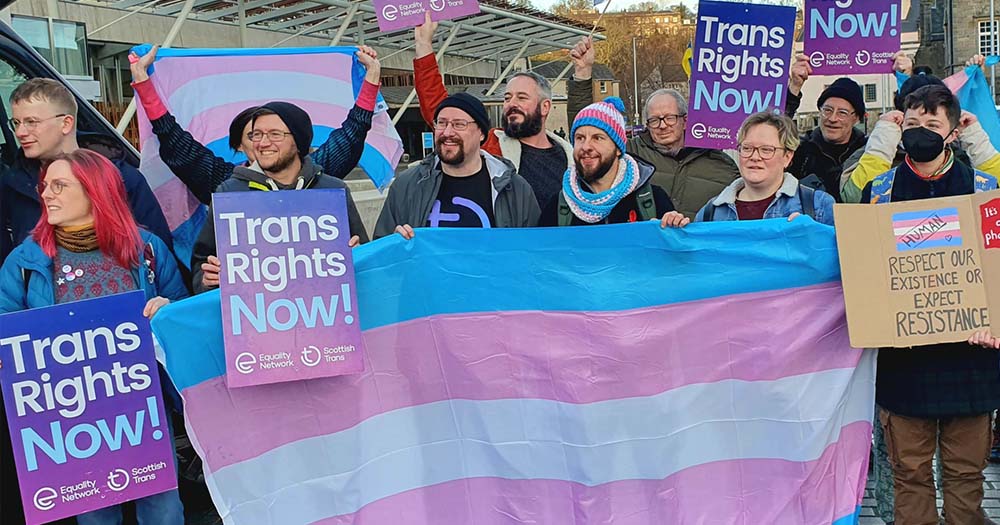Scotland is set to vote on a landmark Gender Recognition Reform bill on Wednesday, December 21. If passed, the new legislation will make it easier for trans people to gain a Gender Recognition Certificate (GRC) and update their birth cert.
The proposed legislation removes the gender dysphoria medical diagnosis requirement that was previously needed in order to apply for a GRC. It also lowers the minimum age for applicants from 18 years old to 16 years old, and reduces the required time for an applicant to live in their gender before being eligible to apply from two years to three months.
The bill passed its first round of votes in October, and since then there has been steady, growing support for updating the self-identification process. Despite some opposition, the Scottish Human Rights Commission issued a report earlier this year stating that there is no, “…objectively evidenced real and concrete harm that is likely to result from the reforms”. The UN Independent Expert on Sexual Orientation and Gender Identity, Victor Madrigal-Borloz, also echoed this statement.
? Calling all Scotland-based folk!
TODAY is the final vote to reform the Gender Recognition Act in Scotland.
Email your MSPs to ask them to support the Bill and #ComeOutforTransEquality. It takes 2 mins with our tool ?https://t.co/jCQUo6l0H7
— Stonewall (@stonewalluk) December 21, 2022
Scottish LGBTQ+ organisations and activists have campaigned and urged politicians to update the outdated legislation which was established in 2004. More than 60 LGBTQ+ organisations in the nation wrote to their MSPs to express their support for the bill, explaining that the proposed reforms would help protect trans people and improve their quality of life.
In a collective letter, the groups explained: “This week, the Scottish Parliament has a historic opportunity to continue Scotland’s journey towards full social and legal equality, for all LGBT+ people, by passing a new law which will remove bureaucratic and dehumanising barriers to legal gender recognition for trans men and women.
“As an LGBT+ community we have seen the repeal of Section 28, protection from discrimination, and equal marriage as some of the key steps forward in a country that respects all who live here, no matter who they love or who they are.
“In this journey we have learned that we are stronger when we are united,” it added.
There has been an overwhelming flood in of support ahead of tomorrow and Wednesday.
60+ LGBTI+ orgs have signed a letter uniting in support of the Gender Recognition Reform Bill.
You can see the letter here: https://t.co/gmtDxOA4iV
— Equality Network (@LGBTIScotland) December 19, 2022
With this vote on the Gender Recognition Reform, Scotland is positioned to join Ireland and other countries including Norway and Argentina that have self-ID laws which make the process of changing one’s gender on a birth certificate less medicalised and invasive.
© 2022 GCN (Gay Community News). All rights reserved.
Support GCN
GCN is a free, vital resource for Ireland’s LGBTQ+ community since 1988.
GCN is a trading name of National LGBT Federation CLG, a registered charity - Charity Number: 20034580.
GCN relies on the generous support of the community and allies to sustain the crucial work that we do. Producing GCN is costly, and, in an industry which has been hugely impacted by rising costs, we need your support to help sustain and grow this vital resource.
Supporting GCN for as little as €1.99 per month will help us continue our work as Ireland’s free, independent LGBTQ+ media.

comments. Please sign in to comment.